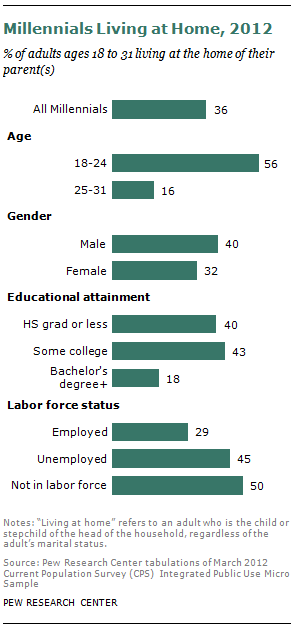Why Marriage is (Still) a Vital Pathway to Independence
3 min read
Date Published: 08/26/2013
Last Updated: 05/12/2025
National Fatherhood Initiative Blog / Latest Articles
3 min read
The following is a post from Christopher A. Brown, Executive Vice President of National Fatherhood Initiative (NFI).
I’m sure you’ve heard that more young adults—the Millenials—are living with their parents. It’s been all over the news in recent years in large part because of the recent economic recession. But as with most things, you have to look beyond the sound bites in the media to see the forest for the trees.

Let’s start with the data. According to a recent Pew Research Center report, a record 36% of Millenials (ages 18-31) lived with their parents in 2012. This proportion is even greater than the 34% who lived with their parents when the economic recession officially ended in 2009. To be fair to these young adults and their parents, as many as half might be college students because the census data used for this analysis considers children living in dormitories as living with their parents.
Nevertheless, the fact that a record number of Millenials live with their parents is a cause for concern. Parents must shoulder the financial load for their children for a longer period of time than parents of previous generations. This lengthens financial burden and negatively affects parents’ ability to save for their own retirement. That effect is particularly troubling given a recent study on Americans’ difficulty in saving adequately for their retirement. That difficulty, as we all know, places a burden on other sources of financial support in retirement provided by us all (i.e. Social Security). And this increased financial burden creates an increased emotional burden as parents worry about their own and these young adults’ futures, not to mention the tension that naturally exists between adults parenting other adults who live in the same home.
What’s driving this trend? If you only listen to the media, you might have said it’s the economy. That’s only part of the picture. There are three driving factors: declining employment, rising college enrollment, and declining marriage. Specifically, Millenials who are either unemployed, enrolled in college, or unmarried are more likely to live with their parents. (I surmise that the more of these factors that describe a young adult, the more likely he or she is to live at home.)
The starkest difference within each of these categories is between married and unmarried Millenials—47% of unmarried Millenials live with their parents compared to only 3% of married Millenials. To put that difference in perspective, let’s say you were to walk into a room of 100 unmarried Millenials with the intention of interviewing one of them about their thoughts on this trend. You’d have a 50-50 shot at randomly picking one who lives at home. Try that in a room of 100 married Millenials and it might take you a very long time to find someone.
To turn a phrase, “It’s marriage (not the economy)—stupid.” While the other two factors should concern us, it is the long-term trend in the decline of marriage that is creating a sea change. Employment is cyclical. The economy is improving. Increased college enrollment—while down among men (another cause for concern)—is good in the long run. (And remember that as many as half of these children are actually living away from home for most of the year.) Parents should consider supporting their college-enrolled children as an investment in their own and their children’s futures. College graduates are more likely to have higher salaries and earn more in their lifetime. They are also more “marriageable.”
The lesson here is that marriage continues to be a critical path to independence. Think of it as one leg in a three-legged stool of independence. That stool is very wobbly because the importance of marriage in our society is being whittled down to a nub. (Cohabitation, which the Pew report notes is rapidly on the rise, is not substitution for marriage.) Parents tend to focus on the education and employment legs, and rightly so. What parents often neglect, however, is to send a clear message about the importance of marriage—not only its importance as the ideal situation in which to raise children, but how vital it is to parents’ and their children’s eventual independence from one another.
What action should parents take? Send a clear, frequent message to their children that marriage is just as critical for independence as a college education and gainful employment.
Date Published: 08/26/2013
Last Updated: 05/12/2025
Download this free guide for a proven 7-step roadmap—from making the case and securing funding for your program, to launching and measuring real results!


Train Your Staff
Fatherhood Programs
Fatherhood Data
© 2026 National Fatherhood Initiative®. All rights reserved.